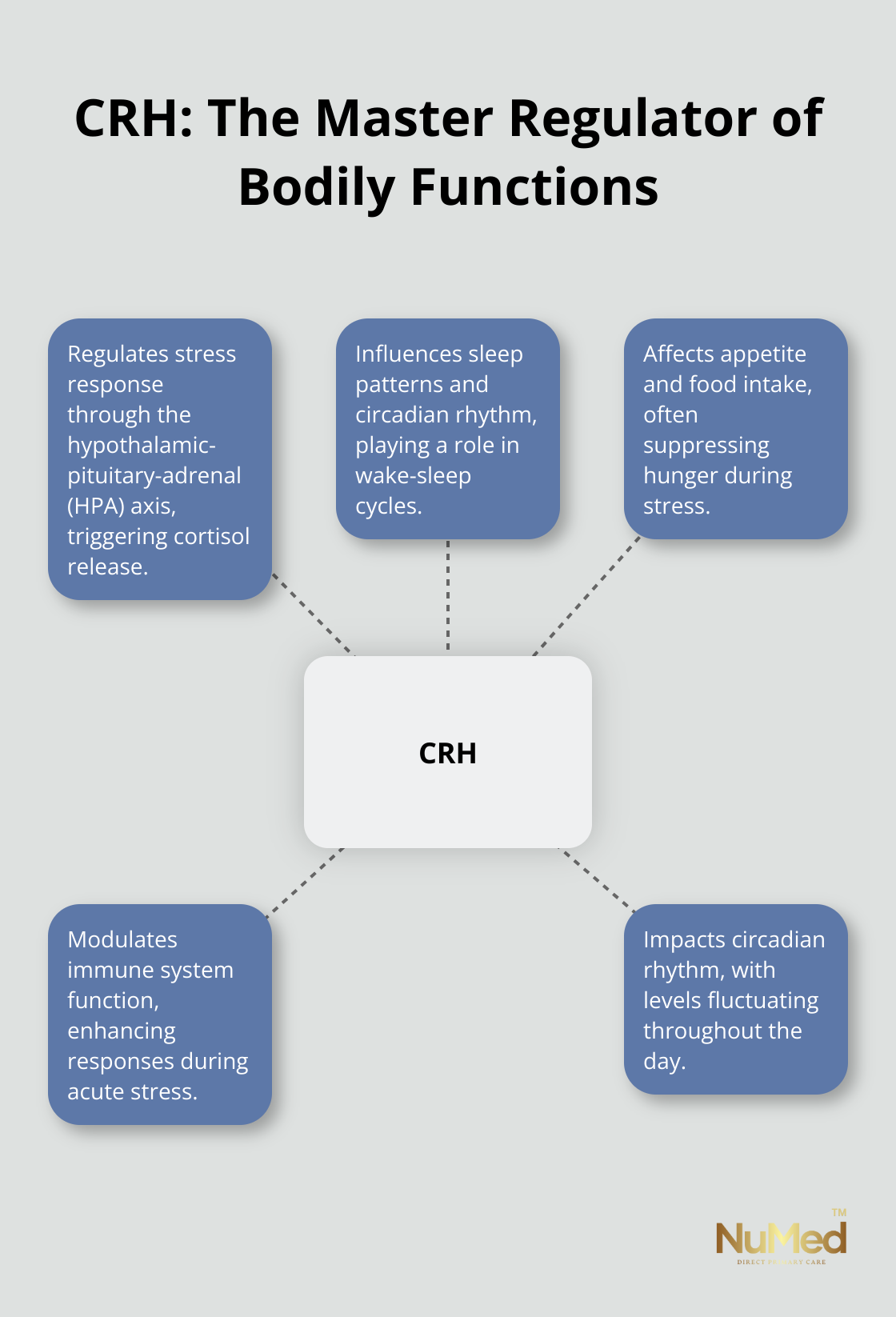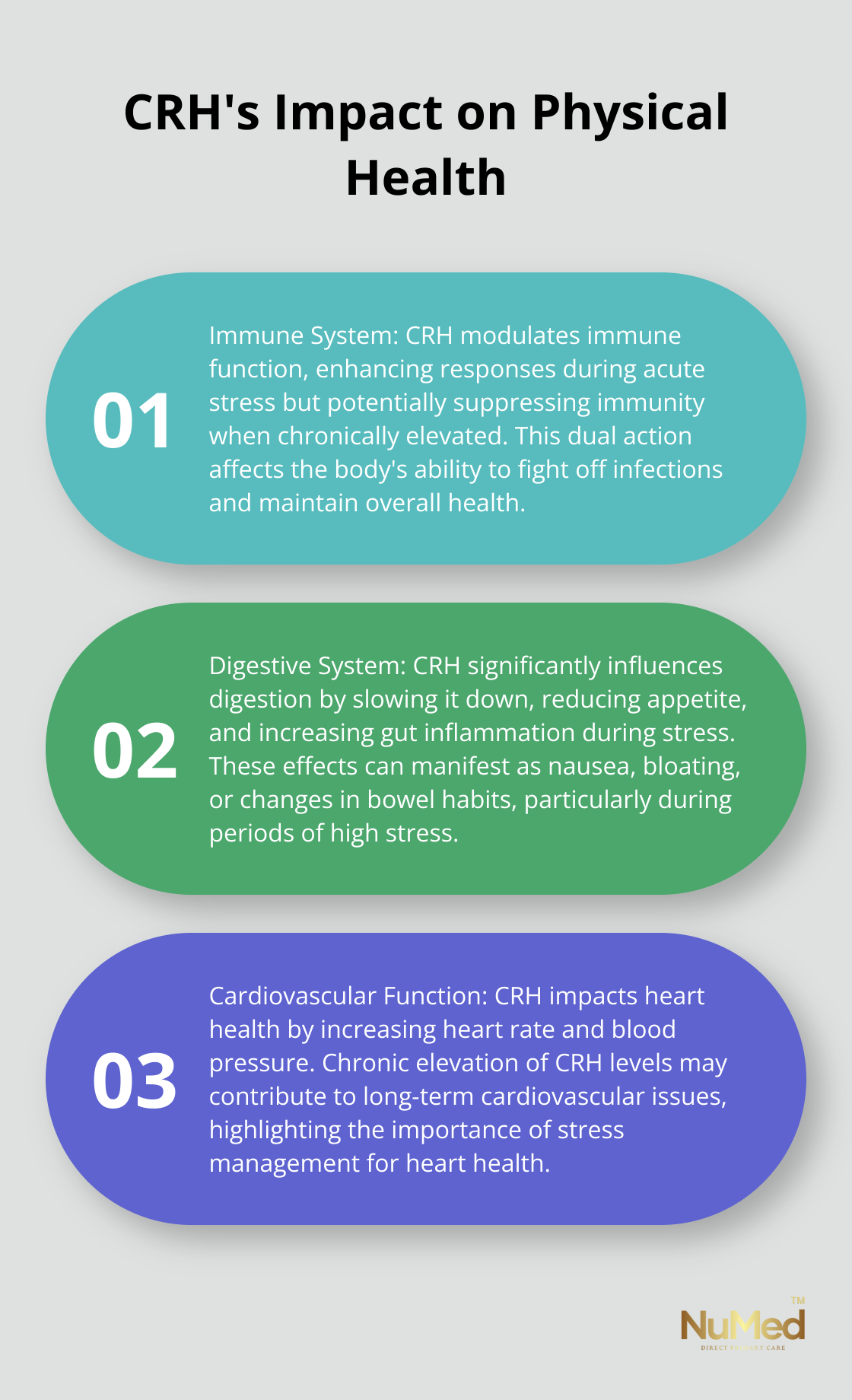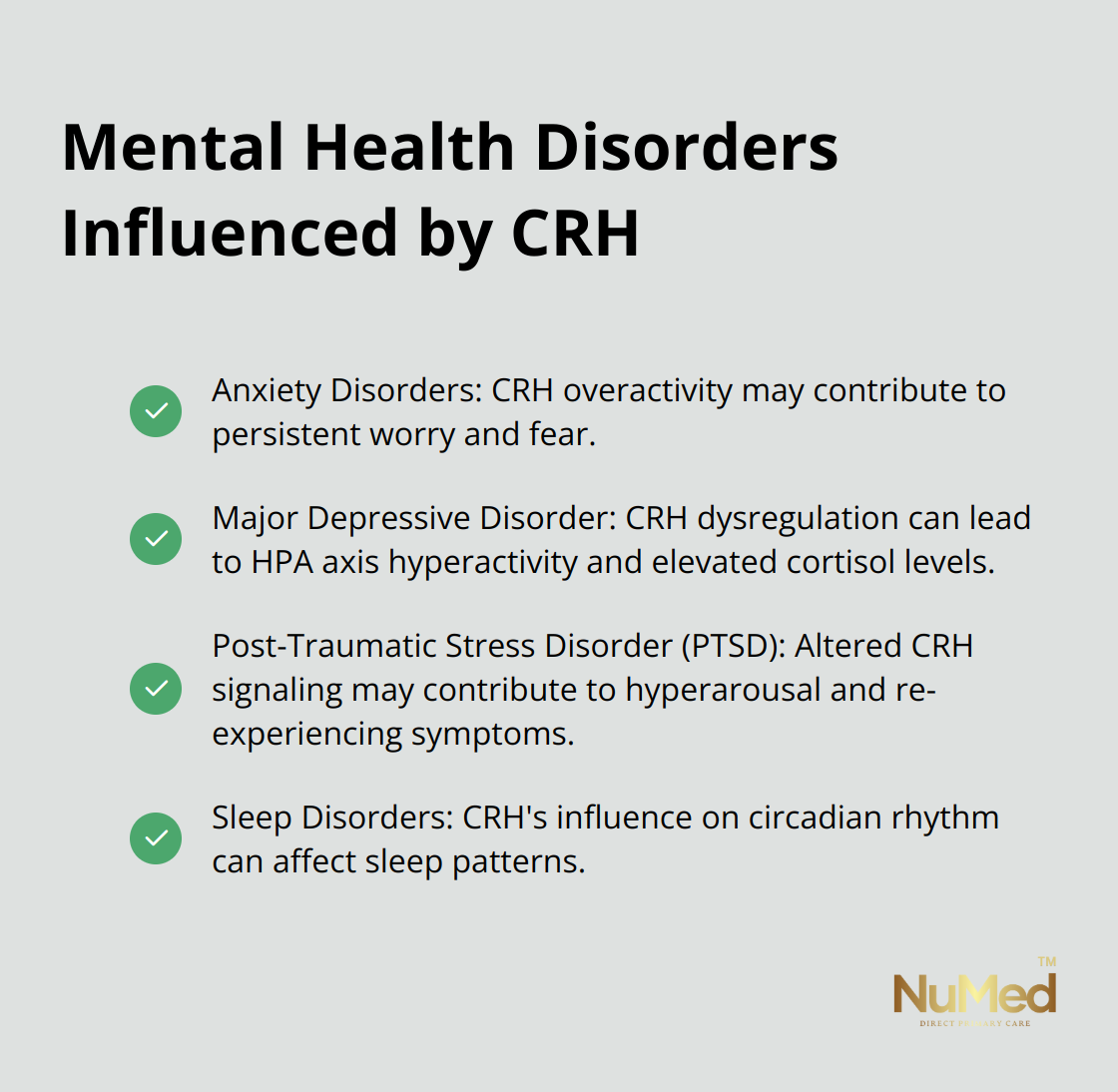At NuMed DPC, we’re committed to helping our patients understand the intricate workings of their bodies. Corticotropin-releasing hormone (CRH) plays a vital role in our stress response and overall health.
This powerful hormone impacts not only our physical well-being but also our mental state. In this post, we’ll explore CRH’s functions, its effects on various bodily systems, and its potential implications for future medical treatments.
The Function of Corticotropin-Releasing Hormone (CRH)
CRH: The Master Regulator of Stress
Corticotropin-releasing hormone (CRH) stands as the key player in our body’s stress response system. This hormone, produced primarily in the hypothalamus, acts as the master regulator of our stress reactions. Its effects manifest in various ways, influencing multiple bodily systems.
Production and Release Mechanisms
The hypothalamus serves as the main production site for CRH. The hypothalamus releases CRH in response to various stimuli, including stress, exercise, disease, blood cortisol levels, and circadian rhythm. After waking up, CRH is released, initiating a cascade of hormonal responses.
The Stress Response Cascade
Once CRH reaches the anterior pituitary, it stimulates the production and release of adrenocorticotropic hormone (ACTH). ACTH then travels through the bloodstream to the adrenal glands, prompting the release of cortisol – often called the “stress hormone.” This process forms the core of what’s known as the hypothalamic-pituitary-adrenal (HPA) axis.
CRH’s Far-Reaching Impact
The effects of CRH extend beyond stress management. It influences our sleep patterns, appetite, and even our immune system.

Regulating CRH Levels
While direct control of CRH levels isn’t possible, lifestyle choices can influence them. Regular exercise helps regulate the HPA axis.
Mindfulness practices like meditation also play a role.
Personalized strategies for managing stress and optimizing HPA axis function can include tailored exercise plans, nutrition advice, and stress management techniques. Addressing CRH regulation improves overall health and well-being, tackling issues at their root rather than just treating symptoms.
As we explore CRH’s impact on physical health in the next section, we’ll uncover how this powerful hormone influences our immune system, and digestive processes, and even plays a role in pregnancy and fetal development.
How CRH Affects Your Body
Corticotropin-releasing hormone (CRH) impacts multiple aspects of our physical health, extending far beyond its primary role in stress response. Understanding these wide-ranging effects provides insight into comprehensive care for patients.
CRH and the Immune System
CRH significantly modulates immune function. During acute stress, CRH enhances immune responses, potentially helping the body fight off infections more effectively. However, chronic elevation of CRH can lead to immune suppression, increasing susceptibility to illnesses.
CRH’s Impact on Digestion
The digestive system responds sensitively to CRH fluctuations. Elevated CRH levels slow down digestion, reduce appetite, and increase inflammation in the gut. This can manifest as symptoms like nausea, bloating, or changes in bowel habits during stressful periods.
CRH in Pregnancy and Fetal Development
During pregnancy, CRH levels naturally increase, peaking just before delivery. This hormone surge plays a vital role in fetal development and the timing of birth. However, abnormally high CRH levels link to preterm labor and low birth weight.
CRH and Cardiovascular Health
CRH also influences cardiovascular function. It can increase heart rate and blood pressure, potentially contributing to long-term cardiovascular issues if chronically elevated.

Understanding CRH’s impact on physical health allows for a more holistic approach to wellness. Addressing stress and its physiological effects can work towards better overall health outcomes. The next section will explore how CRH influences mental health and its potential implications for treating psychological disorders.
How CRH Affects Mental Health
CRH and Anxiety Disorders
Corticotropin-releasing hormone (CRH) significantly impacts anxiety disorders. Research has shown that CRF 1 receptor antagonists can have anxiolytic effects in animal models, and that CRF 1 receptor knockout mice exhibit reduced anxiety. This finding suggests that an overactive CRH system may contribute to the persistent worry and fear characteristic of anxiety disorders.
Depression and CRH Imbalance
CRH dysregulation also plays a role in major depressive disorder. Research indicates that patients with depression often exhibit hyperactivity of the hypothalamic-pituitary-adrenal (HPA) axis, which CRH largely drives. This overactivity can result in chronically elevated cortisol levels, potentially contributing to the persistent low mood and lack of motivation seen in depression.
PTSD and CRH Dysfunction
Post-traumatic stress disorder (PTSD) involves CRH dysfunction as well. Studies have shown that individuals with PTSD exhibit altered CRH signaling in the brain. This dysregulation may contribute to the hyperarousal and re-experiencing symptoms (such as flashbacks and nightmares) characteristic of PTSD.

Therapeutic Potential of CRH-Targeted Treatments
The recognition of CRH’s involvement in these mental health disorders has spurred the development of new therapeutic approaches. Pharmaceutical companies currently work on CRH receptor antagonists as potential treatments for anxiety, depression, and PTSD. While still in clinical trials, these drugs show promise in reducing symptoms by directly targeting the CRH system.
Holistic Approaches to Mental Health
A comprehensive approach to mental health considers not just psychological factors but also underlying physiological processes like CRH regulation. Care plans often include strategies to balance the HPA axis and manage stress, which can help modulate CRH levels and improve mental health outcomes. These strategies may involve a combination of lifestyle changes (e.g., regular exercise, stress reduction techniques) and targeted interventions.
Final Thoughts
Corticotropin-releasing hormone (CRH) plays a central role in our body’s stress response and overall health. This powerful hormone influences our physical well-being and mental state, making it a key factor in maintaining balance and wellness. CRH’s impact extends beyond its primary function, affecting our immune system, digestive processes, cardiovascular health, and even pregnancy and fetal development.
The future of CRH research holds exciting possibilities for new therapeutic approaches, particularly for mental health disorders. These potential treatments could offer hope for individuals struggling with conditions like anxiety and depression. Scientists continue to uncover the intricate workings of CRH, which will shape future medical practices and lead to more comprehensive healthcare strategies.
At NuMed Direct Primary Care, we understand the importance of addressing root causes for optimal health. We offer personalized care plans that consider the complex interplay of hormones like CRH and their effects on overall wellness. Our approach to healthcare aims to help patients achieve better health outcomes through targeted and effective treatments for stress-related disorders.
















